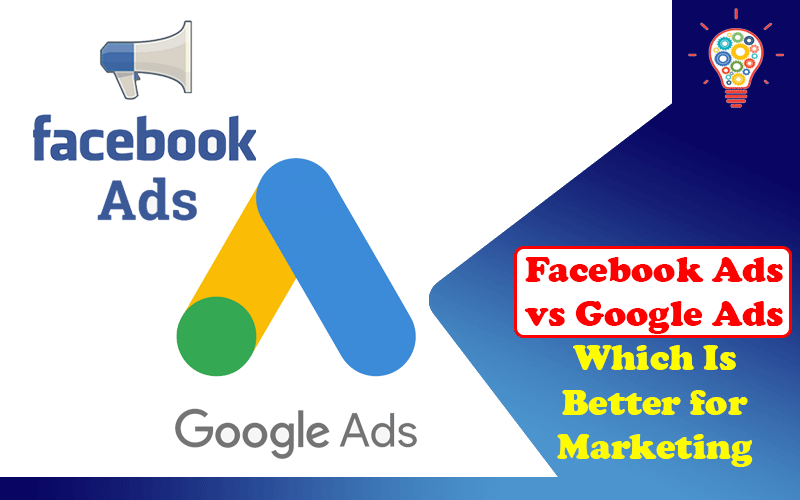Facebook and Google ads are two major players in the online advertisement market. Both have a huge user base and can be used to get more engagement on Facebook or drive customers to your brand or business. But not everyone has such deep pockets to advertise on both platforms, so like thousands of other users you’ve ended up on this article to get a clear comparison and choose which one is the better choice for your marketing strategy.
Table of Contents
Google Ads (Paid Search) and Facebook Ads (Paid Social)
Google Ads is paid search which means that you are paying Google to have your listing displayed on the search engine’s result page. Your ad is placed based on the keywords that you provide, instead of targeting a particular group of audience. You can also adjust your Google ads campaign to target audiences based on location as well as several other factors. But that’s not all as Google Ads lets you advertise on other Google platforms that include:
- Google Search
- YouTube Ads
- Google Display Network
- Google Shopping
- Google Maps
- Google Play
Unlike Google Ads, Facebook Ads offers paid social advertising. The recent changes in Facebook’s algorithm have made it pretty difficult to get more engagement on Facebook through traditional methods. This makes Facebook ads pretty crucial for your business or brand’s growth. Facebook ads are also one of the easiest and quickest ways to gain Facebook likes. Facebook places its ads on:
- Facebook News Feed
- Instagram Feed
- Facebook Marketplace
- Facebook Video Feeds
- Facebook Right Column
- Audience Network
- Facebook Messenger
Now that you know the basics of Facebook Ads and Google Ads, it’s time to jump into the main course of this article- Facebook Ads Vs Google Ads.
Facebook Ads Vs Google Ads: What’s the difference?
-
Size of audience
You can have an enormous reach with both marketing platforms. On average, Google handles around 5.8 billion search queries in a single day while Facebook’s users are estimated at around 2.6 billion. Mobile advertising is mostly responsible for approximately 60% and 90% of Google and Facebook’s marketing revenue respectively making mobile advertising an opportunity you shouldn’t shy away from. Both of them have such a huge audience that it makes no sense to choose one on the basis of just their audience size. Instead, you can make your decision on the basis of what you’re marketing is a common brand that might feature in a lot of search queries. If this is the case then go for Google Ads otherwise you should go for Facebook Ads.
-
Buyer intent
Buyer intent refers to the probability that someone is going to buy your product/service or not. This is the category where Google Ads almost always take down Facebook Ads given that you are marketing a brand or business that provides a product/service of daily use.
For example, a user is looking for the best laptops on the market then Google will show him advertisements related to laptops just above the search results which substantially increases the chance of making a conversion. While no one is going to remember what they saw on Facebook three months back. When it comes to buyer intent, Google Ads is the clear winner, and that too by a long margin.
-
Targeting options
Both Google and Facebook provide you with a host of options to help you target specific audiences. Some of the common targeting options include age, gender, location, income level, device types out of the numerous options available. Apart from these common targeting options, Facebook has tons of other advanced targeting options that let you single out your target audience for a much more efficient online marketing experience thanks to the info they collect from their 2.6 billion users. So in this round, Facebook is the clear winner with its advanced audience targeting options.
-
Ad Format
Ad format refers to how your ad is displayed on a website and is one of the most important factors when it comes to how a user perceives your ad. If you use Google Ads then you will have a small block of text show up whenever someone searches for a query that is related to your brand or business. You can make use of ad extensions to add additional information but overall your ad is going to be limited to just text in Google ads. While Facebook provides you with several ad formats for your advertisement campaign. Facebook Ads include videos, images, carousel ads, and much more as Facebook keeps on rolling out new ad formats to prevent the user from “ad fatigue” making Facebook a winner in this category.
Conclusion
The winner depends on the campaign goals and the industry type of the brand or business being marketed. If your marketing goals align with increasing sales then you should go with Google ads and if you want to increase your brand’s recognition or gain Facebook followers as well as Instagram followers then Facebook ads are the one for you. Google works on both B2B as well as B2C businesses while Facebook works best on B2C businesses especially those that sell less expensive items forcing people to buy something impulsively. Now that you know all about Google Ads as well as Facebook Ads, you can use this knowledge to make an informed decision and choose the one that best suits your needs.

